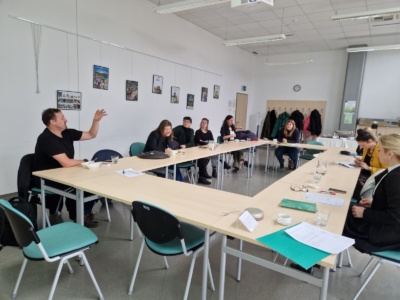Clear Cities – sharing knowledge and good practices for less waste
As part of the European Clear Cities project, which will run until the end of spring 2027, partners from seven European countries are exchanging knowledge and good practices in the field of waste management.
The Regional Development Agency of the Ljubljana Urban Region has recruited a wide range of local stakeholders for the project team on the Slovenian side, thereby expanding the possibilities for upgrading policies and practices in Slovenia. At the first meeting in Apeldoorn, the Netherlands, Jože Gregorič from the Public Company Voka Snaga and Maja Rijavec from the association Smetumet presented Slovenian good practices.
The data on waste collection in Slovenia makes us a role model in waste separation compared to the countries mentioned. Jože Gregorič from the Public Company Voka Snaga presented the management model in the Netherlands. Sweden, the Netherlands and northern Italy stand out in this field, especially with regard to the digitalization of services, where the fixed part of the waste collection tariff includes the collection of all separated fractions, while the general waste is charged separately for each household. Such a model encourages individuals to behave more responsibly, as this is directly reflected in the monthly costs. At the same time, it makes it possible to monitor the fill level of the bins and optimize the logistics of waste collection.
Within the project, the Regional Development Agency of the Ljubljana Urban Region focuses on connecting partnerships and involving different stakeholders in policymaking. Based on the knowledge gained and the input of the Slovenian working group, they will prepare the starting points for the inclusion of the waste sector in the regional development program after 2027. In doing so, they will also consider the needs of the creative industries and start-ups, which can make an important contribution to the development of reuse with breakthrough technologies in the field of waste processing. This often includes organizations that use creative workshops to strengthen disappearing skills (sewing, repairing) that extend the life of products. The presentation of good practices by Maja Rijavec from the association Smetumet in the Netherlands was also based on these principles.
Below we present the practices of Public Company Voka Snaga and the association Smetumet, which were presented in the Netherlands.
How do we manage waste in our country?
In the Netherlands, Jože Gregorič, project manager and expert in the field of waste management, presented the tools used by Public Company Voka Snaga to carry out sorting analyses of different types of waste and their results, which also helped to understand the behaviour of different types of users. With a comprehensive system of separate collection system, modern infrastructure and the central Ljubljana Regional Waste Management Centre (RCERO Ljubljana), Public Company Voka Snaga records a high level of separate collection in its area of operation (11 municipalities) – as much as 68.1% of municipal waste. The system is based on types of separate waste collection, including the door-to-door collection of biological waste, packaging, paper and glass, as well as 80 underground collection units in the city centre, which improve the appearance and efficiency of collection. The city operates 55 collection vehicles and conducts regular analyses of waste composition with the aim of improving processes, and the data is also a valuable starting point for more targeted awareness-raising among residents.
RCERO Ljubljana plays a key role in mechanical-biological waste treatment, where 9% of treated mixed municipal waste is recycled, 74% is used as fuel, and only 9% ends up in a landfill. Biological waste is turned into compost and biogas through anaerobic digestion, which is used to generate electricity and heat.
In addition to effective waste management, Ljubljana is also actively involved in educational programs for companies, institutions and schools, for which, for example, special container painting has been introduced.
Circular world with Smetumet
Smetumet transforms waste into opportunity – through sustainable design and awareness raising. They actively involve the public in working towards a waste-free future. They serve as actors in the circular economy and use creativity and humour to find useful solutions for waste.
They connect with experts and legislators to refresh traditional perspectives. They accompany contemporary design with storytelling and are particularly keen to involve vulnerable groups. They add practical solutions to complex issues: for example, their stylish bags made from waste tarpaulins, climbing ropes and car seatbelts are recognizable, and their new Special Needs Friends made from used toys are popular with children. They have already worked with over 80 companies, 200 experts and 15 municipalities.
You will find more about the Clear Cities project here.


